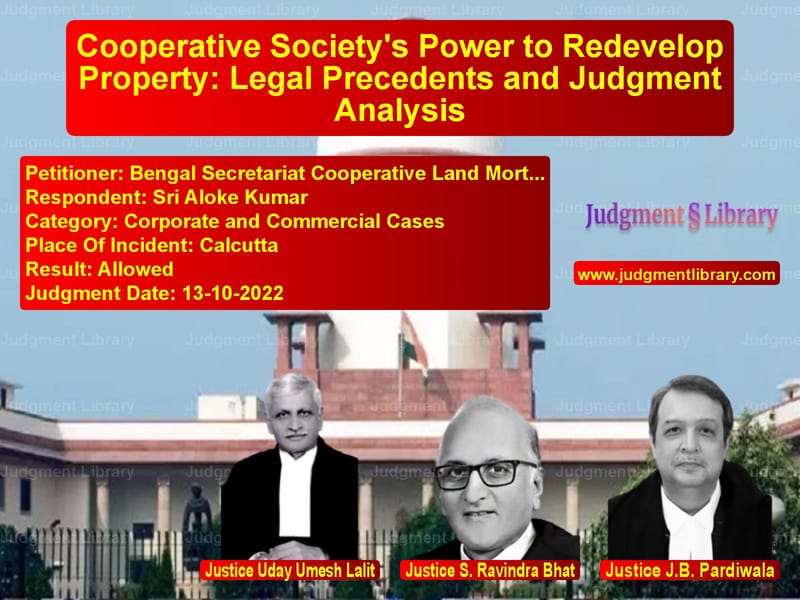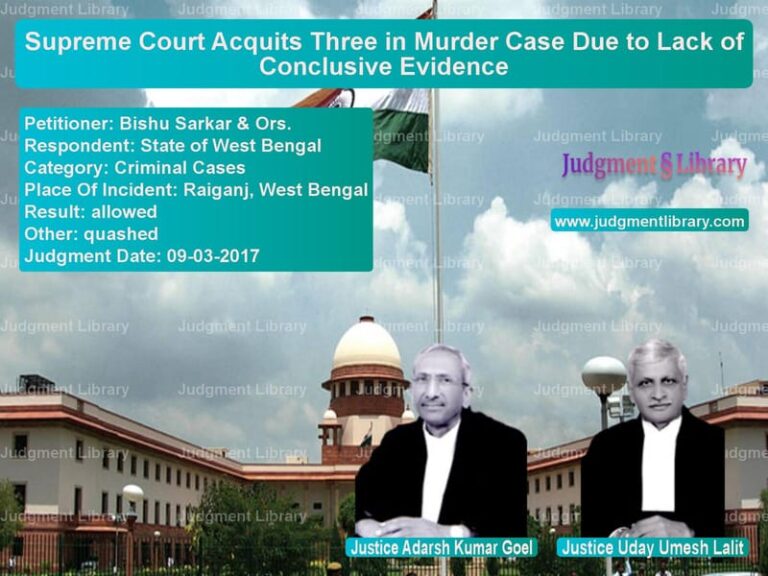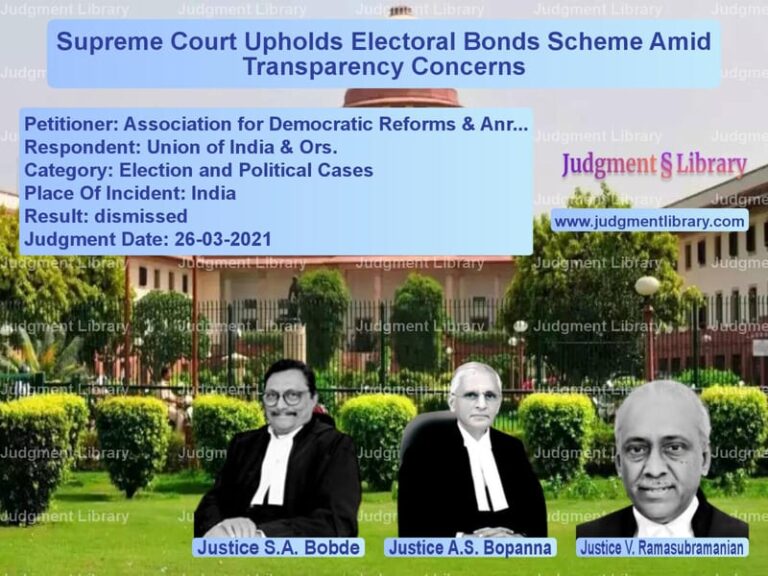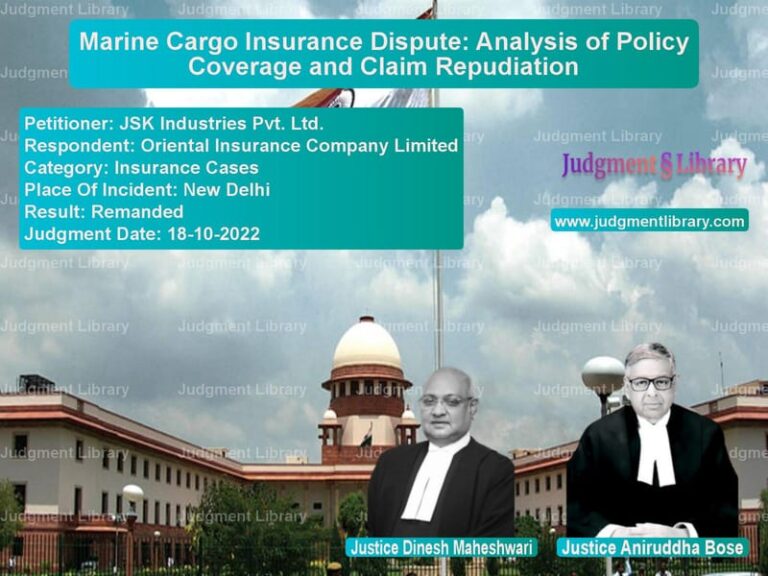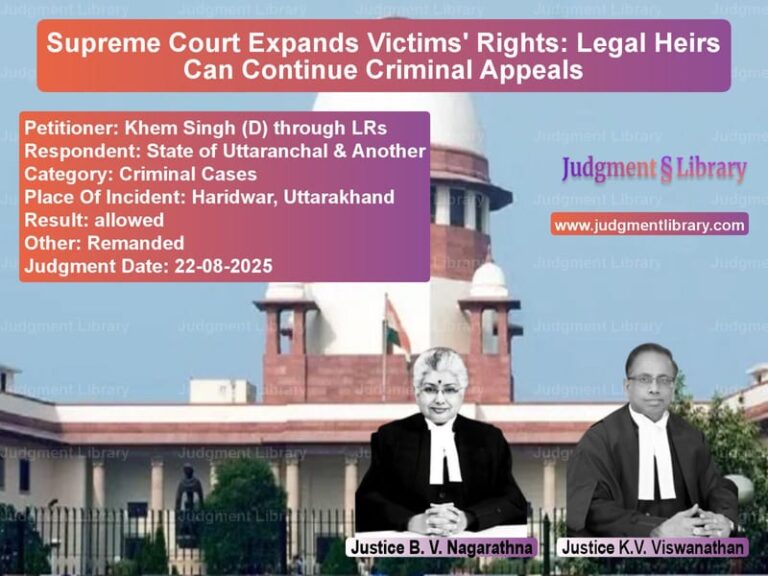Cooperative Society’s Power to Redevelop Property: Legal Precedents and Judgment Analysis
The case at hand revolves around the Bengal Secretariat Cooperative Land Mortgage Bank and Housing Society’s appeal against the decision of the Calcutta High Court regarding the redevelopment of its administrative building. The legal dispute, which spans decades, centers on the rights of a cooperative society to involve third-party developers for its development projects.
Background: The Bengal Secretariat Cooperative Land Mortgage Bank and Housing Society, established under the West Bengal Co-operative Societies Act, 1940, has faced a prolonged legal battle regarding the redevelopment of its dilapidated administrative building. The dispute began when the Society sought to demolish the existing structure and replace it with a new one through a joint venture with the Hi-Rise Apartment Makers Pvt. Ltd.
Factual Matrix: The Appellant Society was formed in 1945 with the aim of providing housing to its members. The administrative building, over 100 years old, had deteriorated and posed a risk to its inhabitants. As a result, the Society initiated a redevelopment project, but certain members, particularly Respondent No. 1, created obstacles to the project, which led to years of litigation. Respondent No. 1 questioned the legality of the actions taken by the Appellant Society, particularly the appointment of a third-party developer, Hi-Rise.
Key Arguments:
The Appellant’s arguments centered around the principle of cooperative autonomy and the power of the General Body of the Society to make decisions for the welfare of its members. The counsel for the Appellant, Mr. Joydeep Mazumdar, emphasized that the General Body’s decision to appoint a third-party developer was in line with the statutory provisions and was supported by the majority of the members. The Appellant argued that the High Court had erred in its interpretation of the cooperative laws and the spirit of the cooperative movement. Mr. Mazumdar also referred to Section 28 of the West Bengal Co-operative Societies Act, 2006, which gives final authority to the General Body of a cooperative society. Additionally, the Appellant pointed out that the High Court had failed to consider the practical realities of financing such a large-scale project, which was estimated to cost around Rs. 20 crore. In the absence of member contributions, the only viable option was to engage a third-party developer.
The Respondent, on the other hand, argued that the decision to engage a third-party developer was inconsistent with the cooperative spirit, which emphasizes self-reliance and the collective participation of members. Mr. Soumo Palit, representing Respondent No. 1, contended that the High Court had rightly observed that the involvement of a commercial entity for profit-driven motives was at odds with the ethos of cooperative societies. He further argued that the Society had failed to adhere to the specific directions of the arbitral award, which called for a special general meeting instead of an annual general meeting for decision-making regarding the redevelopment project.
Court’s Analysis:
The Court reviewed the provisions of the West Bengal Co-operative Societies Act and the Rules governing the operation of cooperative societies. The Court observed that while the Act does not explicitly allow for the engagement of third-party developers, it also does not prohibit such actions. The Court further emphasized that the cooperative movement is based on the principles of democracy, autonomy, and member participation. However, it also acknowledged that practical considerations, such as the high cost of redevelopment, sometimes necessitate external involvement. The Court referenced the constitutional amendments, specifically the 97th Amendment, which conferred a constitutional status to cooperative societies, further reinforcing their autonomy and democratic functioning.
Judgment:
In its final analysis, the Court concluded that the High Court had incorrectly interpreted the cooperative laws and the role of third-party developers in the redevelopment process. The Court ruled that the General Body’s decision to appoint the Hi-Rise developer was valid and should be upheld. The Court also clarified that the redevelopment of the administrative building, which was in a dilapidated condition, was a necessity for the safety and betterment of the society. The appeal was allowed, and the impugned judgment of the High Court was set aside. The Appellant Society was permitted to proceed with the redevelopment project as per the resolutions passed by the General Body.
Conclusion:
The judgment highlights the tension between the commercial interests of third-party developers and the cooperative principles that govern such societies. While the Court upheld the autonomy of the cooperative society, it also recognized the need for practical solutions when the society’s members are unable to undertake large-scale projects on their own. The case serves as a reminder of the evolving nature of cooperative societies and the need for a balanced interpretation of their legal framework.
Petitioner Name: Bengal Secretariat Cooperative Land Mortgage Bank and Housing Society Ltd..Respondent Name: Sri Aloke Kumar.Judgment By: Justice Uday Umesh Lalit, Justice S. Ravindra Bhat, Justice J.B. Pardiwala.Place Of Incident: Calcutta.Judgment Date: 13-10-2022.
Don’t miss out on the full details! Download the complete judgment in PDF format below and gain valuable insights instantly!
Download Judgment: bengal-secretariat-c-vs-sri-aloke-kumar-supreme-court-of-india-judgment-dated-13-10-2022.pdf
Directly Download Judgment: Directly download this Judgment
See all petitions in Company Law
See all petitions in Corporate Governance
See all petitions in unfair trade practices
See all petitions in Judgment by Uday Umesh Lalit
See all petitions in Judgment by S Ravindra Bhat
See all petitions in Judgment by J.B. Pardiwala
See all petitions in allowed
See all petitions in supreme court of India judgments October 2022
See all petitions in 2022 judgments
See all posts in Corporate and Commercial Cases Category
See all allowed petitions in Corporate and Commercial Cases Category
See all Dismissed petitions in Corporate and Commercial Cases Category
See all partially allowed petitions in Corporate and Commercial Cases Category

